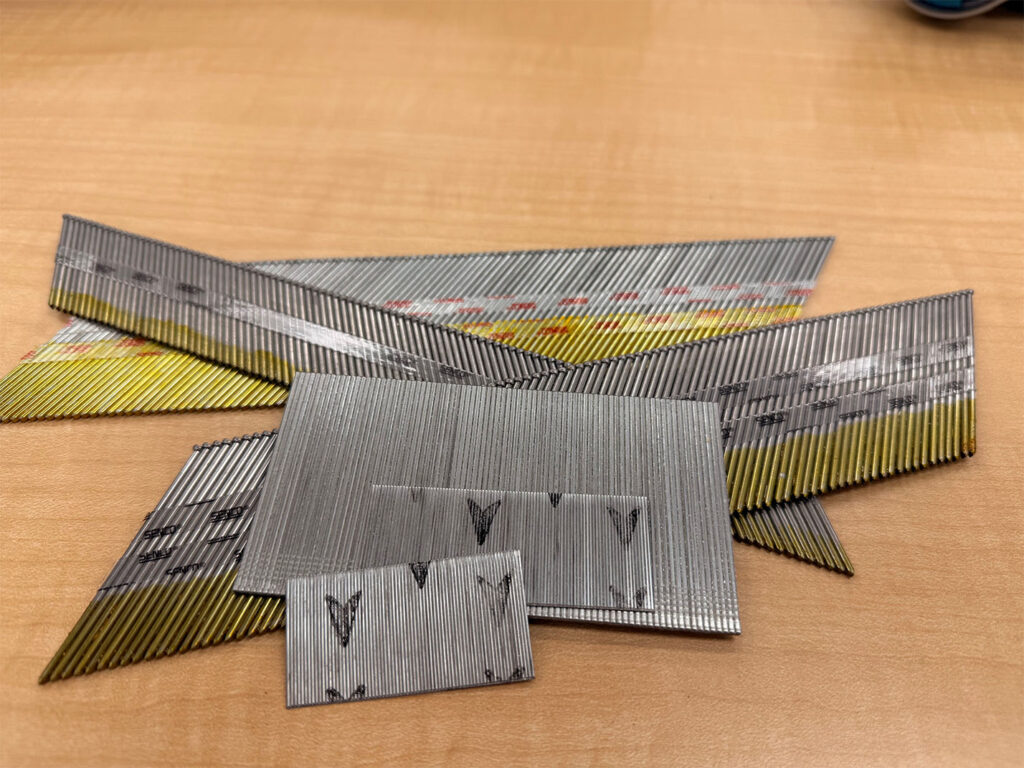How to Choose the Right Nail for Your Woodworking Project

Brad Nails vs. Finish Nails vs. Pin Nails – What’s the Difference?
Choosing the right fastener makes all the difference in the quality and longevity of your woodworking project. Whether installing trim, cabinets, or delicate molding, selecting the correct type of nail is crucial. In this guide, we’ll break down the differences between brad nails, finish nails, and pin nails, highlighting their specific uses, strengths, and the types of projects for each.
SEE FINISHING & WOODWORKING NAILS
It’s All About Thickness
The first thing to understand about the difference between brad, finish, and pin nails is how nail diameter is measured. A nail’s gauge is a measurement of its diameter or thickness – the lower the gauge, the thicker the nail, and the higher the gauge, the thinner the nail.
Brad, finish, and pin nails fall between 15- and 23-gauge and are commonly used in finish / trim and woodworking applications. Lower-gauge, thicker nails provide a stronger hold for heavier or denser material, but create bigger holes that requires touch up. Higher-gauge, thinner nails provide less holding power but leave behind smaller nail holes that can be almost invisible and require no touch-up.
Brad Nails: The Most Versatile and Commonly Used
Brad nails are a popular choice for woodworking projects due to their versatility and ease of use. Typically 18-gauge, brad nails are middle-of-the-road in size, making them perfect for attaching lightweight trim, small moldings, and other delicate wood pieces without splitting the material.18-gauge nailers are a valuable addition to any shop or toolbox.
Strengths and Uses:
- Versatility: Brad nails are suitable for a wide range of applications, from baseboards to crown molding.
- Reduced Splitting: The medium gauge of brad nails minimizes the risk of splitting thinner materials.
- Small Holes: Brad nails leave smaller holes than finish nails, though they may require some touch-up.
- Nails for Trim: Brad nails are ideal for securing lightweight trim where a strong hold is necessary, but a delicate touch is required.
Use Brad Nails For:
- Trim Work: Perfect for installing baseboards, chair rails, and other trim work where an inconspicuous, secure hold is needed.
- Small Projects: Ideal for lightweight woodworking projects like picture frames and decorative items.
Finish Nails: The Heavy-Duty Performer
Finish nails are thicker and stronger than brad nails, typically available in 15- or 16-gauge. They are designed for heavier woodworking projects where a more robust hold is required. For these kinds of tasks, a 15-gauge nailer or 16-guage nailer is often the preferred choice, especially for thicker trim or more substantial wood pieces.
Strengths and Uses:
- Durability: Finish nails provide a stronger hold, making them ideal for more demanding applications.
- 15- or 16-Gauge Nails: These nails are thicker, providing greater holding power and making them suitable for securing heavier material, though touch-up will be required.
- Nails for Trim: For more substantial trim, like door and window casings, finish nails ensure a solid, long-lasting hold.
Use Finish Nails For:
- Large Trim: Ideal for thicker trim, like door casings and baseboards, where a stronger hold is necessary.
Cabinetry: Perfect for assembling and securing heavy cabinetry, where strength and durability are a priority.
- Heavily Used Areas: Finish nails are a good choice for areas that require a lot of movement such as door or window jambs.
Pin Nails: The Delicate Touch
Pin nails are the smallest and most delicate of the three types, typically 23 gauge, although SENCO’s 21-guage nails are a favorite among woodworkers who want more holding power with no touch-up. These tiny nails are almost invisible once driven, making them perfect for delicate molding, veneer, and other intricate woodworking tasks. A 21-guage pin nailer or a 23-gauge pin nailer is essential for working with these nails, providing the precision needed to avoid damaging the workpiece. Any time glue is used, pin nails are recommended to ensure a secure bond
Strengths and Uses:
- Invisibility: Pin nails leave virtually no visible marks, making them perfect for finish work where appearance is key.
- Delicate Materials: Ideal for working with thin veneers, small moldings, and other fragile materials.
- Pin Nailer: A pin nailer is specifically designed to handle these tiny nails with precision and care.
Use Pin Nailers For:
- Delicate Molding: Perfect for securing delicate moldings where even a brad nail might be too large.
- Decorative Work: Ideal for adding decorative trim to furniture or other intricate woodworking projects.
- Glued Pieces: Pin nails can replace clamps when using wood glue to secure materials together, creating a better hold than wood glue alone. Whenever glue is used, a pin nailer is required to ensure a secure hold.
Choosing the Right Nail for Your Project
Selecting the right nail for your woodworking project depends on the specific needs of the task at hand. For versatile, all-purpose use, brad nails are an excellent choice. For more robust, heavy-duty projects, finish nails provide the necessary strength. And for delicate, precise work, pin nails offer the subtlety and finesse needed to achieve a flawless finish.
As always, make sure the gauge of the nails you choose matches the gauge of your finish, trim, or woodworking nailer. Using incorrectly sized nails can result in jams and malfunctions.

